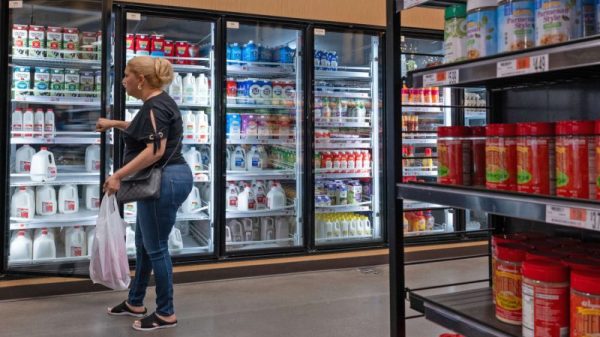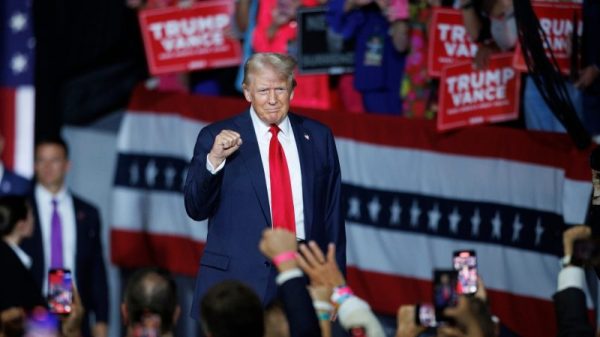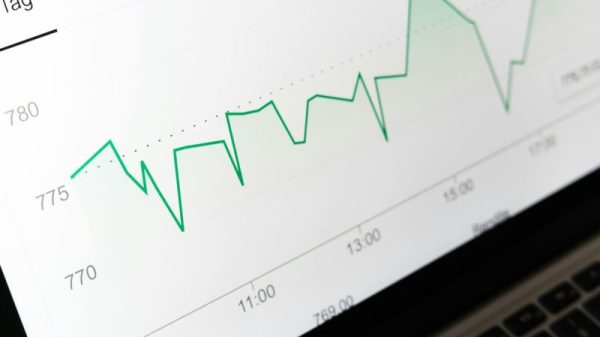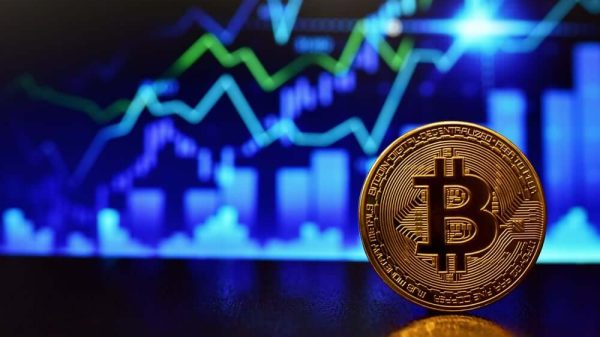FIRST ON FOX: A bipartisan group of five lawmakers are sending a letter Friday, urging the Biden administration to fully enforce laws preventing goods manufactured with forced labor from entering through American ports.
The lawmakers — led by Rep. Carol Miller, R-W.Va., and who are all members of the House Ways and Means Committee — penned the letter to Customs and Border Protection (CBP) Acting Commissioner Troy Miller. They urged Miller to ensure full enforcement of the 2021 Uyghur Forced Labor Prevention Act (UFLPA), especially as it pertains to the billion-dollar solar industry, citing information showing his agency may be falling short of the law’s requirements.
‘In the name of climate change, the Biden Administration is surrendering the United States to the CCP. By allowing solar panels manufactured with Chinese polysilicon to avoid detection, they are encouraging Uyghur forced labor, distorting the market, and killing American jobs,’ Miller told Fox News Digital in a statement.
‘I am calling on Customs and Border Patrol to strongly enforce the Uyghur Forced Labor Prevention Act and stop products that were made by forced labor into the United States. We have the moral obligation to have a strategic decoupling from China and their inhumane labor practices,’ she continued.
The letter Friday referenced comments from an executive at Chinese solar panel maker JA Solar which were made during a recent call with investors. The remarks were obtained by the Ways and Means Committee and shared with Fox News Digital.
The executive suggested that, since U.S. customs officials started enforcing the UFLPA last year, the solar industry has identified that there may be some American ports where products originating from China are more easily released into the U.S.
‘Any companies that continue to skirt U.S. law designed to prevent economic benefits from these crimes must be stopped and held accountable,’ the lawmakers wrote to Miller. ‘In this regard, we are concerned that statements by an executive at JA Solar, a solar company located in the PRC with supply chain ties to Xinjiang, recently stated publicly that its shipments are treated differently depending on which U.S. port the products enter.’
‘This is unacceptable, particularly if it suggests that some ports are not providing appropriate scrutiny to fully implement the UFLPA,’ they continued. ‘We cannot give JA Solar or any company a free pass to import goods tainted with forced labor into the U.S.’
The group — which, in addition to Miller, included Reps. Blake Moore, R-Utah, Greg Steube, R-Fla., Terri Sewell, D-Ala., and Brad Wenstrup, R-Ohio — further called on the CBP to coordinate ‘civil society, private industry and through the interagency task force to ensure all products entering the U.S. are in full compliance with the UFLPA.’
In 2021, Sen. Marco Rubio, R-Fla., introduced the UFLPA to prohibit goods made with Uyghur forced labor in Xinjiang from entering the U.S. and empower the Department of Homeland Security and CBP to maintain a list of Chinese entities linked to forced labor. President Biden signed the legislation into law months later and it went into effect in June 2022.
Federal data published by CBP, though, suggests that, while CBP is stopping solar shipments originating from China under the UFLPA, it releases the majority of those shipments into the U.S. market.
To date, the CBP has detained a total of 2,412 shipments of electronics worth $1.5 billion, but has only denied 36% of those shipments which have an estimated worth of $391 million, according to the most recent data updated on Sept. 12. The electronics category includes solar panel supplies.
The UFLPA and broader push in the West to crack down on Chinese forced labor practices came after a series of reports and studies tying the solar panel industry, particularly the production of raw material polysilicon, and other industries like clothing manufacturing to facilities in China’s Xinjiang province. About 40% of global polysilicon manufacturing is located in Xinjiang, according to a July 2022 analysis from the International Energy Agency (IEA).
For example, a May 2021 report published by Sheffield Hallam University’s Helena Kennedy Centre for International Justice in the U.K. highlighted how the Chinese government deploys ‘labor transfer’ programs in Xinjiang which consist of forcibly placing millions of indigenous citizens and members of the Uyghur Muslim minority into jobs.
The report determined the programs are ‘tantamount to forcible transfer of populations and enslavement’ and are utilized for polysilicon production in Xinjiang.
And late last year, the bipartisan and bicameral Congressional-Executive Commission on China released its 2022 annual report which concluded that senior Chinese government officials continue to carry out mass detention and persecution of Uyghur minorities in Xinjiang. Authorities also continue to maintain a system of forced labor of former mass internment camp detainees and other Turkic and Muslim individuals.
Still, the Chinese government has repeatedly denied both that it employs any forced labor programs and that China’s solar industry uses forced labor.
‘The so-called ‘forced labor’ is flat-out lie of the century fabricated by institutions and personnel in certain Western countries such as the United States. There is no ‘forced labor’ in the production of photovoltaic products in Xinjiang, China,’ Chinese government spokesperson Liu Pengyu previously told Fox News Digital in a statement.
‘Employees in Xinjiang choose occupations according to their own wishes, sign labor contracts with photovoltaic companies in accordance with the principle of equality and voluntariness and the law, and obtain corresponding remuneration,’ Pengyu said. ‘Xinjiang implements a proactive labor and employment policy, which effectively protects the basic rights of people of all ethnic groups to employment.’
Overall, China continues to dominate the global solar supply chain even as nations including the U.S. attempt to increase domestic manufacturing capabilities. According to the July 2022 IEA report, China has a greater than 80% share in all the manufacturing stages of solar panels. China produces a staggering 95% of all global polysilicon, ingot and wafer supplies necessary for solar products.
The IEA concluded that Chinese government policies identifying the solar industry as a ‘strategic sector’ have helped strengthen the nation’s solar supply chain. In 2021, the nation exported $30 billion worth of solar supplies, equivalent to roughly 7% of China’s trade surplus in recent years.
The Biden administration, meanwhile, continues to aggressively push solar energy investments as part of its climate agenda. Biden announced in 2021 his goal for the U.S. to have a carbon-free power grid by 2035, a target that would require a massive solar energy expansion nationwide. About 3% of the nation’s utility-scale electricity is currently generated by solar power.
The CBP and JA Solar didn’t immediately respond to requests for comment.


































